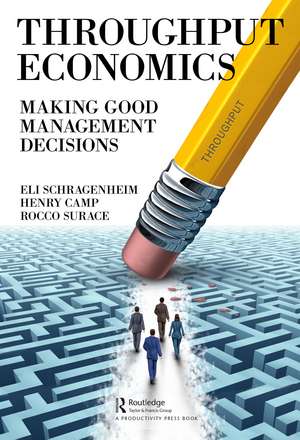Throughput Economics: Making Good Management Decisions
Autor Eli Schragenheim, Henry Camp, Rocco Suraceen Limba Engleză Hardback – 25 iun 2019
Boaz Ronen, Professor Emeritus, Coller School of Management, Tel Aviv University, Tel Aviv, Israel
"Throughput Economics is a must read for entrepreneurs and managers who want to make their organizations more and more antifragile."
Andrea Zattoni, CEO of Antifragility, Italy
"Management accounting is a dry topic. Throughput Economics is not—managers can learn a lot they can apply to their company from it."
Rudolf Burkhart, Business Development Director, Vistem Gmbh, Germany
Throughput Economics challenges the current thinking of how to evaluate cost, risks and rewards of any deal or any other new market opportunity being considered, especially the practice of calculating cost-per-unit. Instead, this book offers a process that directly answers the critical question: If we accept the proposed decision, will the performance of the organization improve?
The process involves the intuition of the key people in the organization, together with the relevant data, to come up with the best available information from which to form a reasonable range of net profit, when the considered decision is added on top of all the other activities undertaken by the organization. The process is explained and demonstrated using a variety of cases where the organization faces a new non-trivial idea, along with a detailed explanation of how it should work, including software support that provides very quick response to many what-if suggestions.
This book offers a new and well-defined process, applicable to every organization, that considers both financial impacts and capacity limitations and, also, includes the impact of uncertainty by providing the range of reasonable results rather than one number, which is always proven wrong in the end. Overall, the book provides a holistic method for simplified decision making in seemingly complex or shifting environments using a constraints mindset to facilitate companies’ realization, for the first time, their true potential.
| Toate formatele și edițiile | Preț | Express |
|---|---|---|
| Paperback (1) | 330.16 lei 43-57 zile | |
| Taylor & Francis – 30 iun 2021 | 330.16 lei 43-57 zile | |
| Hardback (1) | 502.51 lei 43-57 zile | |
| Taylor & Francis – 25 iun 2019 | 502.51 lei 43-57 zile |
Preț: 502.51 lei
Preț vechi: 591.18 lei
-15% Nou
Puncte Express: 754
Preț estimativ în valută:
96.16€ • 99.79$ • 80.38£
96.16€ • 99.79$ • 80.38£
Carte tipărită la comandă
Livrare economică 17-31 martie
Preluare comenzi: 021 569.72.76
Specificații
ISBN-13: 9780367030612
ISBN-10: 0367030616
Pagini: 286
Ilustrații: 70 Illustrations, color
Dimensiuni: 178 x 254 x 23 mm
Greutate: 0.82 kg
Ediția:1
Editura: Taylor & Francis
Colecția Productivity Press
Locul publicării:Oxford, United Kingdom
ISBN-10: 0367030616
Pagini: 286
Ilustrații: 70 Illustrations, color
Dimensiuni: 178 x 254 x 23 mm
Greutate: 0.82 kg
Ediția:1
Editura: Taylor & Francis
Colecția Productivity Press
Locul publicării:Oxford, United Kingdom
Public țintă
Professional Practice & DevelopmentCuprins
Introduction. Chapter 1 The need for an improvement over ‘Cost Accounting’ methodology – Daily Bread, Part 1. Chapter 2 A Conceptual, yet Natural, Way to Make Decisions. Chapter 3 Information is derived from Hard Data, Intuition and Assessment of Uncertainty. Chapter 4 Throughput – a key concept pointing in a sensible direction – Daily Bread, Part 2. Chapter 5 More on the problematic nature of capacity. Chapter 6 Analyzing a Simple Case – P&Q, Part 1. Chapter 7 Some thoughts about accounting principles and standards. Chapter 8 A more realistic case – Daily Bread, Part 3. Chapter 9 Using what-if analysis to support mutual decisions. Chapter 10 T-generators and Critical Resources – Two new required terms. Chapter 11 Finding more to sell – Choco-for-You, Part 1. Chapter 12 Evaluating the next leap in performance and its required investment – Choco-forYou, Part 2. Chapter 13 Analyzing the significant decisions as explored in the Choco-for-You case. Chapter 14 The Role of Time and Timing in Decision Making. Chapter 15 Cash as a special critical resource. Chapter 16 The Quality of Earnings – from the perspective of a TOC minded CPA. Chapter 17 Now, it’s time for a Big Move- Daily Bread, Part 4. Chapter 18 An Analysis of Acquisitions. Chapter 19 Management attention as a special critical resource. Chapter 20 The Critical Nature of Metrics. Epilogue: What we have Covered Together. Appendix A. Modeling and data Requirements for Performing the What-If Scenarios. Appendix B. Specifics on What Metrics to Use and When they are Applicable. Appendix C. Table of Figures. Appendix D. Table of Tables.
Notă biografică
Eli Schragenheim, Henry Camp, Rocco Surace
Descriere
This book offers a new and well-defined process that applies to every manufacturing organization and many others that consider both financial impacts and capacity limitations, and also includes the impact of uncertainty by providing the range of reasonable results instead of one number, which is always proven wrong in the end.
